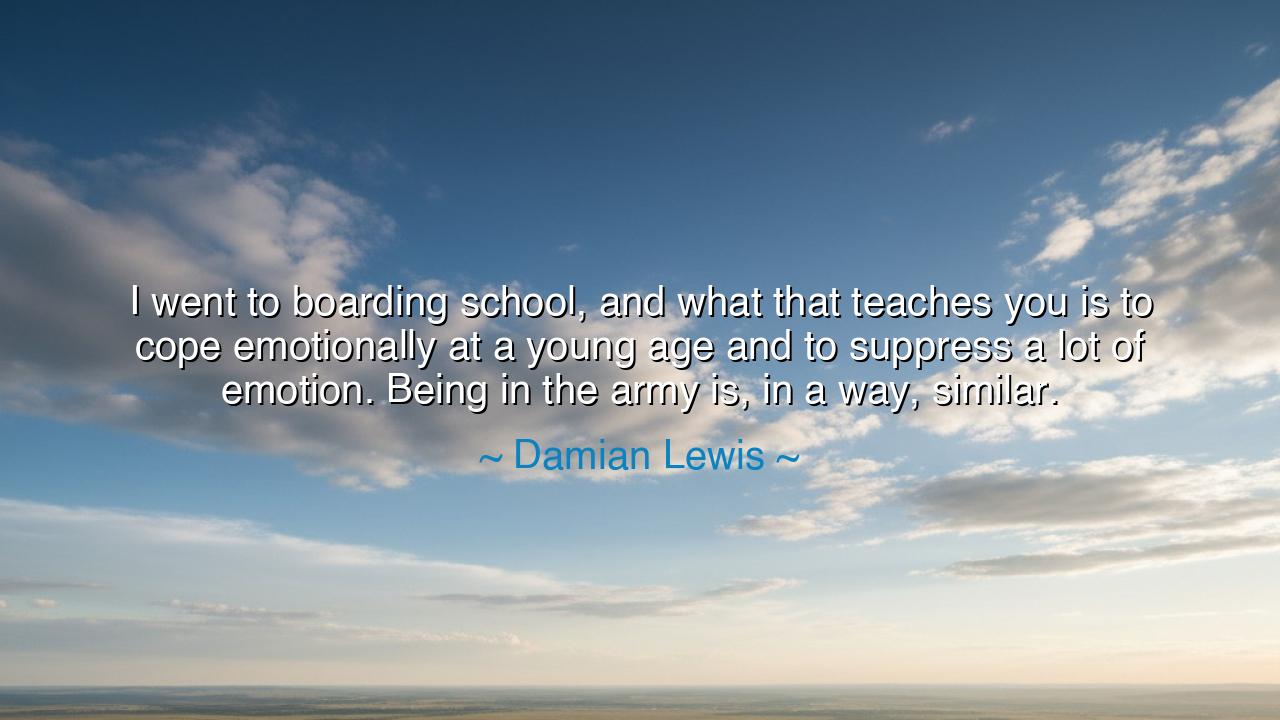
I went to boarding school, and what that teaches you is to cope
I went to boarding school, and what that teaches you is to cope emotionally at a young age and to suppress a lot of emotion. Being in the army is, in a way, similar.






When Damian Lewis said, “I went to boarding school, and what that teaches you is to cope emotionally at a young age and to suppress a lot of emotion. Being in the army is, in a way, similar,” he spoke with the quiet authority of one who has seen the strength — and the cost — of discipline. His words reveal a truth that stretches beyond the walls of schools or the trenches of war: that emotional endurance can both forge resilience and conceal wounds. In his reflection lies the story of many who have been trained, by circumstance or by system, to bear their burdens in silence, to appear strong even when the heart trembles.
The boarding school, as Lewis describes, is not merely a place of learning, but a crucible. It removes the child from the warmth of home and demands that he become his own keeper. Within its rigid order, affection is measured, and sentiment often seen as weakness. The boy learns to cope emotionally — to master loneliness, to find control in routine, to survive through composure. But in learning to endure, he also learns to suppress: to bury longing, to silence fear, to disguise tenderness. Such discipline is not without purpose, yet it carries a shadow, for what is suppressed does not vanish — it hides, waiting to shape the man who emerges.
When Lewis draws the parallel to the army, he reveals a deeper wisdom. The soldier, too, is taught to command his emotions, to obey reason and duty even when the soul rebels. To weep, to doubt, to falter — these are seen as luxuries a soldier cannot afford. In both institutions — the school and the military — the individual is trained to serve something greater than himself: order, discipline, endurance. And yet, while such training forges strength, it also demands sacrifice. The price of composure is often the loss of vulnerability; the cost of courage is silence in the face of pain.
This truth has echoed through the ages. The great warriors and leaders of old — from Alexander the Great to Marcus Aurelius — were taught early to master their feelings, to rule the passions that could destroy them. Yet the wisest among them understood that emotion, if denied entirely, becomes a secret tyrant. Marcus Aurelius himself, though emperor and philosopher, wrote nightly meditations to keep his soul from hardening. He knew that stoicism is not the absence of feeling, but the control of it. Lewis’s reflection carries this same spirit: it is not a celebration of repression, but an acknowledgment of its power and peril alike.
The origin of Lewis’s words lies in his own upbringing and career. Before he was an actor known for portraying soldiers and kings, he was a boy shaped by the solitude and discipline of the British boarding school system — a world that values composure above confession. Later, as he embodied soldiers on screen — men torn between duty and humanity — he came to recognize how both experiences shared the same rhythm: the steady heartbeat of restraint beneath the noise of conflict. His insight is not judgment, but understanding — that in learning to survive, we sometimes forget how to feel.
From this, a lesson emerges for all who seek strength: do not confuse suppression with mastery. To control emotion is noble; to bury it is dangerous. The soul, like the body, needs breath. The warrior must weep in private, the leader must reflect in solitude, the artist must feel in order to create. True endurance does not come from silence, but from balance — from knowing when to restrain and when to release. The wise heart does not drown emotion, but channels it toward purpose, as the river guides the storm toward the sea.
So let this teaching stand: strength is not the absence of feeling, but the courage to face it. The child who learns to cope too soon must, in time, learn also to heal. The soldier who has fought too long must learn to lay down his armor and remember tenderness. In every life, there is a time to suppress and a time to express; the secret of wisdom lies in knowing which moment is which.
And thus, from the quiet truth of Damian Lewis’s words, we are reminded: the world will train you to be hard — but you must not forget how to be whole. The heart that endures without breaking is the one that learns not only to bear the weight of sorrow, but also to let the light of feeling return, again and again, through the cracks of its armor.






AAdministratorAdministrator
Welcome, honored guests. Please leave a comment, we will respond soon